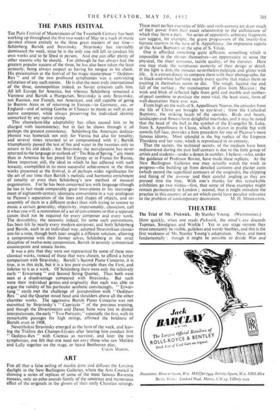THE PARIS FESTIVAL
THE Paris Festival of Masterpieces of the Twentieth Century has been working up throughout the first two weeks of May to a week of music devoted almost entirely to the three great masters of our time— Schonberg, Bartok and Stravinsky. Stravinsky has inevitably dominated the week, since he is the only one still left to conduct his own works and to be feted in person. And one can offer plenty of other reasons why he should. For although he has always had the greatest popular success of the three, he has also been taken the least seriously, being always suspect as having his tongue in his cheek. His presentation at the festival of his tragic masterpiece " Oedipus- Rex " and of the two profound symphonies was a convincing refutation of any such notion. He is also the most truly international of the three, cosmopolitan indeed, as Soviet criticism calls him. All left Europe for America, but whereas Schonberg remained a Viennese and Bartok a Hungarian, Stravinsky is only Stravinsky, not Russian, nor French, nor American, and still capable of going to Buenos Aires or of returning to Europe—to Germany, say, or England—and of setting Goethe or Chaucer to music as well as any native composer, while always preserving his individual identity unmarked by any native stamp.
This chameleon-like adaptability has often caused him to be charged with inconsistency, but in fact he shows through it all perhaps the greatest consistency. Schonberg the American dodeca- phonist was homesick not only for Vienna but also for tonality, and several times returned to or compromised with it ; Bartok triumphantly passed the test of fire and water in the twenties only to return to his old ideals ; but Stravinsky the neo-classicist has never returned to the language or outlook of "The Rite of Spring," any more than in America he has pined for Europe or in France for Russia. More important still, the ideal to which he has adhered with such tenacity, exemplified in its most successful achievement in the three works presented at the festival, is of perhaps wider significance for the art of our time than Bartok 's melodic and harmonic enrichment of tonality or even than Schonberg's new method of musical organisation. For he has been concerned less with language (though he has in fact made comparably great innovations in his rearrange- ment of eighteenth-century idiomatic conventions in a way analogous to Picasso's separation of the lines and shapes of objects, and re- assembly of them in a different order) than with trying to restore to music a certain generality, objectivity, impersonality, classicism, call it what you will, a restoration of a set of conventions so that a separate canon shall not be required for every composer and every work. The desirability, the necessity indeed, for some such conventions, has been felt by nearly every modern composer, and both Schonberg and Bartok, each in an individual way, adopted Stravinskian classic- ism for a time, though both later sought a different solution, allowing a compromise with their former selves, Schonberg in the strict discipline of twelve-note composition, Bartok in severely symmetrical counterpoint and sonata forms.
It was a pity that they were not represented by some of these neo- classical works, instead of those that were chosen, to afford a better comparison with Stravinsky. Bartok 's Second Piano Concerto, it is true, is in this style, but it is a less pure example than the First, and inferior to it as a work. Of Schonberg there were only the relatively early " Erwartung " and Second String Quartet. Thus both were seen at a disadvantage compared with Stravinsky. But such were their individual genius and originality that each was able to argue the validity of his particular aesthetic convincingly. " Erwar- tung " easily met the challenge of juxtaposition with " Oedipus- Rex " and the Quartet stood head and shoulders above all the other Chamber works. The aggressive Bart6k Piano Concerto was not outwitted by Stravinsky's " Capriccio " of the previous evening, and though the Divertimento. and Dance Suite were lost in dismal . interpretations, the early "Two Portraits," especially the first, with its -remarkable passages for high strings, affirmed the boldness of Bartok even in 1908.
Nevertheless Stravinsky emerged as the hero of the week, and leav- ing the Theatre des Champs-Elysées after hearing him conduct first " Oedipus-Rex " with Cocteau as narrator, and later the two symphonies, one felt that one need not envy those who saw Moliere and Lully together on the stage, or heard Beethoven play.
COLIN MASON.










































 Previous page
Previous page